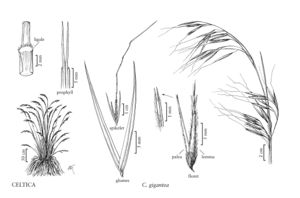Difference between revisions of "Celtica gigantea"
imported>Volume Importer |
GeoffLevin (talk | contribs) m (Corrected EM. to F.M. in authority) |
||
| Line 1: | Line 1: | ||
{{Treatment/ID | {{Treatment/ID | ||
|accepted_name=Celtica gigantea | |accepted_name=Celtica gigantea | ||
| − | |accepted_authority=(Link) | + | |accepted_authority=(Link) F.M. Vazquez & Barkworth |
|publications= | |publications= | ||
|common_names=Giant feathergrass | |common_names=Giant feathergrass | ||
| Line 29: | Line 29: | ||
-->{{#Taxon: | -->{{#Taxon: | ||
name=Celtica gigantea | name=Celtica gigantea | ||
| − | |authority=(Link) | + | |authority=(Link) F.M. Vazquez & Barkworth |
|rank=species | |rank=species | ||
|parent rank=genus | |parent rank=genus | ||
Latest revision as of 20:12, 1 December 2021
Plants forming dense clumps. Culms 1-2.5 m tall, 5-7 mm thick. Prophyll awns to 1 cm, ciliate or glabrous, projecting from the throats of the subtending leaves. Sheaths mostly glabrous, throats ciliate; ligules about 0.5 mm, pubescent dorsally, ciliate; blades to 70 cm, involute, abaxial surfaces smooth, adaxial surfaces scabrous or hirtellous, hairs about 0.3 mm, apices acute. Panicles 30-50 cm, open, lower nodes with more than 1 primary branch, upper nodes with 1 branch, axils glabrous; branches strongly divergent; pedicels equaling or exceeding the spikelets. Glumes glabrous, smooth, 3-veined; lower glumes 25-32 mm; upper glumes slightly longer; florets 14-16 mm; calluses 1.5-2.5 mm; lemmas pubescent, hairs 1-2 mm, apical teeth to 6 mm; awns 6-9 cm; lateral lodicules about 1.5 mm; anthers 10-12 mm. 2n = 96.
Discussion
Celtica gigantea is native to the western and southern portions of the Iberian Peninsula and northern Africa. It is grown as an ornamental in the Flora region. Darke (1999) described it as "one of the most elegant and stately of the ornamental grasses." No attempt has been made to determine which of the infraspecific taxa is grown in the Flora region.
Selected References
None.
